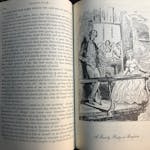Liars
By Steven Gillis. (Rare Bird Books, 205 pages, $24.)
Eric McCanus does not believe in love. A one-hit wonder as an author, he struggles to find a foothold for a second novel. Deeply influenced by his failed marriage, casual relations with women he barely knows, and a conceited confidence in his own cynicism, Eric is intent on convincing the world that love cannot be sustained.
One day he spies a young in-love couple — Matt and Cara — at the market. He's perplexed by their happy affection and stalks them to watch for signs of weakness in their relationship. He decides to make them his perverse project — show them that love can't last.
Eric sneaks into their lives, hiring Cara to landscape his yard and luring poet Matt to join him in a literary project. Soon he's part of the couple's social activities and they come to think of him as a friend.
Slowly he sabotages this perfect couple, finding glee as they come to doubt each other, even seducing Cara and dangling a beautiful artist in front of Matt, who finds an intimate collaboration with her.
This is an evil little book, but it holds Eric's sociopathic intentions up to judgment. The writing is superb, the characters flawed and fascinating, and passages worth highlighting for how they capture the human condition. There are no winners in the end, just the messiness of relationships and love and the vague pursuit of what makes us happy.
GINNY GREENE
A Taste of Paris: A History of the Parisian Love Affair With Food
By David Downie. (St. Martin's Press, 304 pages, $26.99.)
American expat David Downie has spent decades describing his adopted hometown of Paris. This time, in "A Taste of Paris," he takes readers on a tour that pairs the city's physical history with its food. Along the way, he examines the question: Is Paris' reputation for fine food out of date?
With a historian's zeal and a skeptic's eye, Downie traverses the city, pointing out Roman ruins and vestiges of medieval ovens. He points out places where some of the world's first restaurants are still in operation and where hidden gems are tucked around town.
His research unearths the earliest menus and cookbooks and dishes up some surprising tidbits. The splendor of Versailles, for example, did not extend to Louis XIV's dinner table; the Sun King didn't want his food well prepared but piled high and symmetrically arranged. And if only the lowly potato had been accepted sooner, the French Revolution might not have happened. Downie introduces the legendary figures who put France at the top of the food pyramid — the food critic Grimod, the saucy chef Escoffier, the Michelin inspectors — with the whiffs of scandal that shadow them.
Downie clearly loves his city, but he has no qualms about calling out restaurants that appear to be trading on past glory rather than current quality. Be wary of Michelin stars, he says. And as for those quaint bistros offering traditional French fare, ask the waiter if the fish and frites are fresh or frozen. Or go down the alley yourself and listen for the telltale ding of a microwave oven.
Though Downie shares the concerns about the "viral spread of American franchise eating" in Paris, he disagrees with commentators who say that France's food and wine "are in terminal free fall."
"It's a wake-up call," he says. "I'm not looking back to some mythical golden age. I'm enjoying the gold flecks in our current complicated, challenging, fascinatingly alloyed age."
Maureen McCarthy





